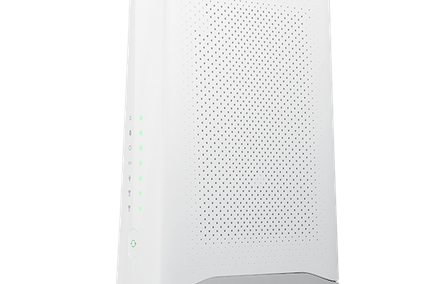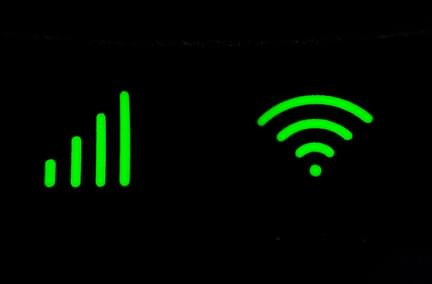Mesh vs. Wi-Fi Extender: What's the Difference?
Jul 20, 2021 | Home Technology, Wi-Fi

What do you do when a single router isn't strong enough to provide a solid Wi-Fi signal throughout your home? In the old days, you had to move your router to a more central location. With the invention of Wi-Fi extenders, the centralized router became less of an issue for spreading signal around the house by simply extending the original signal to the far reaches.
However, while extenders can be a great option, they do come with some limitations. In addition, newer technology has emerged called a mesh network that builds on the benefits of extenders. Let's look at both so you can see which is better for your home.
Single Network vs. Multiple Networks
While a "network extender" logically sounds like a device that would simply extend your existing network, that's not entirely true. When you set up an extender, it creates what amounts to another network, making the "extender" name kind of a misnomer because, while it gets its signal from the original router, the extender operates as its own entity and appears as NetworkName_EXT in your list of available Wi-Fi networks. So while it looks like an extension of your original network because it shares the base name, your device thinks it is another one.
This can cause device confusion. Laptops and phones tend to hang on to their original signal even as performance degrades rather than looking for a stronger signal, often resulting in poor performance in semi-dead spots until the device is entirely inside the new network. This means a device in a bedroom or office in the middle of the house might struggle to get a good signal from conflicting networks, constantly searching, which can slow down internet speeds.
With mesh, the system is all one network, so a phone or laptop has no issues bobbing between the mesh portals because it is not changing networks as the device moves around the house. Instead, it picks up the same signal from the strongest source of the one and only network, resulting in cleaner handoffs.
Distance Limitations
Where is your router? Typically, it is in a far-flung part of your house near the exterior wall where the outside internet cable comes inside. As a result, one side of the house gets a better signal from the original router, thus the need for extenders or a mesh network. But how many? And where?
Conventional wisdom says to only get one per house with a traditional extender because of the separate network issue. If you installed three, for example, your Wi-Fi would reach more of your home, but now you'll also have three different networks.
However, with mesh networking, you can reach the same coverage level with a single network that allows seamless movement throughout the house because the mesh routers talk to each other constantly as one network. This eliminates the guesswork for devices as they move from room to room, finding the best network connection.
Physical Limitations
One consideration with any wireless network system – extender or mesh – is your home's physical characteristics, not just the layout but the building materials. Wi-Fi signals are much like radio signals in that walls and other physical barriers can cause interference. For example, walls, floors, and glass can all affect your Wi-Fi signal. Concrete and metal are especially guilty of signal interference. Therefore, it is essential to layout your wireless system to get the best coverage throughout your home.
Speed Effects
Because a range extender extends the original router's signal (albeit on a new network), it must constantly communicate with the router on the other side of the house. To accomplish this, it spends up to half of its bandwidth receiving and sending the signal to the router. While this might not sound that bad, consider that all this communication occurs on the same antenna and frequency band as the wi-fi signal you're trying to use. As a result, bandwidth from the extender to the device is reduced, slowing down performance.
Mesh networks, on the other hand, typically have two (and sometimes three) communication bands: one for boosting or repeating the network signal – the one your devices pay attention to – and another for talking to each other, thus freeing up the other half of the Wi-Fi bandwidth you need to stream the latest installment of your favorite binge-watch.
Roving AI
Not only does mesh Wi-Fi cover your home with strong bandwidth, the smartest mesh systems, such as Plume, have AI built in to automatically adjust how much bandwidth spreads to various areas based on device requirements, constantly monitoring and altering its coverages as devices power up, power down, or move. It also adjusts based on bandwidth needs. For example, smart light bulbs need very little bandwidth compared to streaming video, so the mesh network adjusts accordingly, maximizing coverage where it's needed the most and turning itself down where needed less.
Downside of Mesh
With all the fantastic benefits to mesh network – and there are quite a few – there is one downside: price, often costing three times what you'd pay for an extender. On the other hand, extenders are a lot less expensive because they are older technology and don't offer the performance levels provided by mesh. So, you are getting more by investing in mesh. The good news is mesh network prices are coming down as more consumers adopt the technology.
One Final Note
No matter which you choose – mesh or extender – the Wi-Fi signal is only as good as thehome internetconnection. For example, if you’re getting 100 MBPS download speed into the router, the most the wireless network can produce is the same 100 MBPS. Be sure the internet speed coming into your home is strong before placing demand on the wireless network. Wondering what it is? You can easily perform a net speed test by clicking here. That will give you both upload and download speeds so you can know what to expect.
- Wi-Fi
- mesh network
- Fiber internet
- wi-fi extender
- plume mesh network





